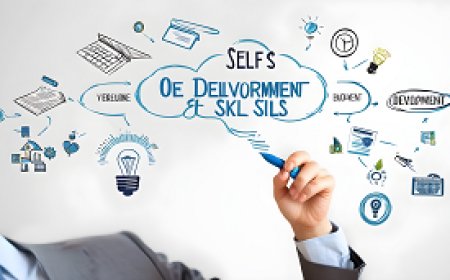How to develop personal skills for university students and graduates
Developing personal skills for university students and graduates is a fundamental challenge in their academic and professional journey. This ongoing process includes various aspects such as enhancing effective communication skills and leadership techniques. Students are encouraged to participate in workshops and events that promote the development of personal skills, whether through public speaking or interactive session facilitation. Additionally, they are urged to improve problem-solving and decision-making skills by engaging in practical educational projects. Taking advantage of external training opportunities and online learning also enhances individual skill development. Furthermore, interacting with the local community plays a vital role in broadening students' horizons and deepening their understanding of social and cultural issues, contributing to a comprehensive improvement of their personal capabilities.

Developing personal skills is a fundamental cornerstone in the journey of university students and graduates, playing a crucial role in achieving personal and professional progress. Understanding how to develop and enhance these skills not only enhances employment opportunities and professional success but also contributes to shaping well-rounded individuals who positively impact the communities they live in. This discussion will explore a range of strategies and methods that students and graduates can adopt to effectively develop their personal skills, whether through engagement in the academic environment or through practical experiences and self-directed training.
Strategies for Developing Personal Skills in University
University life is not only a period of academic growth but also a crucial time for the development of personal skills. Beyond the textbooks and lectures, students have the opportunity to hone skills that are integral to their personal and professional success.
1. Time Management
- Importance: University life is demanding, with multiple commitments such as classes, assignments, and extracurricular activities.
- Strategies:
- Use planners or digital tools to organize tasks and deadlines.
- Prioritize tasks based on importance and deadlines.
- Break larger tasks into smaller, manageable segments.
2. Communication Skills
- Importance: Effective communication is essential for academic success and personal relationships.
- Strategies:
- Participate in class discussions and group projects.
- Seek feedback on written and oral communication from professors.
- Join clubs or societies that involve public speaking or debate.
3. Critical Thinking
- Importance: University education emphasizes critical analysis and problem-solving.
- Strategies:
- Engage actively in class discussions and debates.
- Read a variety of materials to broaden perspectives.
- Challenge assumptions and seek alternative viewpoints.
4. Research and Information Literacy
- Importance: Universities require students to conduct research and navigate vast amounts of information.
- Strategies:
- Attend library workshops on research skills.
- Learn to use academic databases effectively.
- Practice citation and referencing.
5. Stress Management
- Importance: University life can be stressful, and effective stress management is crucial for well-being.
- Strategies:
- Practice mindfulness or meditation.
- Establish a healthy work-life balance.
- Seek support from counseling services if needed.
6. Collaboration and Teamwork
- Importance: Many university assignments involve group work, and collaboration is a key skill.
- Strategies:
- Actively participate in group projects.
- Learn to appreciate diverse perspectives.
- Resolve conflicts within the group constructively.
7. Adaptability
- Importance: University environments are dynamic, and adaptability is vital for success.
- Strategies:
- Embrace changes in coursework or schedules.
- Take on new challenges and extracurricular activities.
- Learn to balance academic and personal responsibilities.
8. Networking
- Importance: Building a network is valuable for future career opportunities.
- Strategies:
- Attend career fairs and networking events.
- Connect with professors, alumni, and industry professionals.
- Join professional organizations related to your field.
9. Financial Literacy
- Importance: University students often manage their finances independently.
- Strategies:
- Create a budget for living expenses and tuition.
- Seek financial advice or workshops offered by the university.
- Explore part-time job opportunities or internships.
10. Goal Setting
- Importance: Setting and achieving goals is a key aspect of personal development.
- Strategies:
- Define short-term and long-term goals.
- Break goals into actionable steps.
- Regularly evaluate progress and adjust goals as needed.
University serves as a transformative period where students not only acquire academic knowledge but also develop a range of personal skills crucial for their future endeavors. Implementing these strategies allows university students to navigate challenges, make the most of opportunities, and emerge well-prepared for the complexities of the professional world. As they master these personal skills, students not only enhance their academic performance but also lay the foundation for a successful and fulfilling life beyond university.
The Impact of Personal Skills Development on Academic and Professional Success
Personal skills development plays a pivotal role in shaping the academic and professional success of university students. As the educational landscape continues to evolve, the emphasis on cultivating a diverse set of skills beyond traditional academic knowledge has become increasingly crucial.
Key Personal Skills for University Students
-
Communication Skills: Effective communication is a cornerstone of success in both academic and professional settings. University students who develop strong written and verbal communication skills are better equipped to convey their ideas, collaborate with peers, and succeed in coursework. These skills are essential for presenting research, participating in group projects, and establishing professional relationships.
-
Critical Thinking and Problem-Solving: The ability to think critically and solve complex problems is vital for academic excellence and professional success. University students who hone these skills can analyze information, make informed decisions, and tackle challenges with a strategic mindset. These skills are particularly valuable in research, project management, and decision-making roles in the professional world.
-
Time Management: University life is characterized by a multitude of responsibilities, from attending classes to completing assignments and participating in extracurricular activities. Developing effective time management skills empowers students to balance these demands efficiently, leading to improved academic performance and the cultivation of a work ethic that will benefit them in their future careers.
-
Adaptability and Resilience: The ability to adapt to new situations and bounce back from setbacks is crucial for success in academia and the professional world. University students who develop resilience can navigate the challenges of rigorous coursework, setbacks in research, and the transition to the workforce with greater ease.
-
Leadership and Teamwork: University experiences often involve group projects and collaborative activities. Students who develop leadership and teamwork skills not only contribute positively to their academic environment but also position themselves for success in a variety of professional settings where collaboration is essential.
Impact on Academic Success
-
Improved Learning Outcomes: Personal skills development enhances the overall learning experience for university students. Effective communication, critical thinking, and time management contribute to improved understanding and retention of academic content.
-
Enhanced Research and Presentations: Strong personal skills are particularly beneficial for students engaged in research activities. The ability to communicate findings, think critically about research questions, and work effectively in a team contributes to successful research projects and presentations.
Impact on Professional Success
-
Career Readiness: Employers increasingly seek candidates with a well-rounded skill set that extends beyond technical expertise. University students who focus on personal skills development are better prepared for the demands of the professional world.
-
Competitive Edge in the Job Market: The job market is highly competitive, and personal skills can be the differentiating factor. Graduates who possess strong communication, critical thinking, and leadership skills stand out to employers seeking versatile and adaptable candidates.
the impact of personal skills development on the academic and professional success of university students is profound. The cultivation of skills such as effective communication, critical thinking, time management, adaptability, and leadership positions students for success in both academic and professional pursuits. As universities continue to adapt to the evolving needs of the workforce, prioritizing personal skills development becomes imperative for students aiming to thrive in their academic journeys and future careers.
Self-Learning Opportunities and Enhancing Personal Skills
In the dynamic landscape of higher education, university students face the challenge of not only acquiring academic knowledge but also developing a diverse set of personal skills essential for success in both academic and professional realms.
The Importance of Personal Skills for University Students
University education extends beyond textbooks and lectures, demanding a broader skill set for students to thrive in diverse situations. The skills considered crucial for university students include effective communication, critical thinking, time management, adaptability, leadership, and teamwork. These skills not only contribute to academic excellence but also serve as a foundation for a successful professional journey.
Self-Learning Opportunities
-
Online Courses and Workshops: The digital age has opened up a wealth of opportunities for self-learning. University students can leverage online platforms to enroll in courses and workshops that cater to specific personal skill development. These resources cover a wide array of topics, from communication and leadership to time management and critical thinking.
-
Extracurricular Activities: Participation in extracurricular activities within the university provides valuable self-learning opportunities. Joining clubs, student organizations, or taking on leadership roles in these activities allows students to enhance their teamwork, communication, and leadership skills in a practical setting.
-
Internships and Co-op Programs: Real-world experiences gained through internships and cooperative education programs offer a unique chance for self-directed learning. University students can apply and reinforce their personal skills in professional settings, gaining insights into effective communication, problem-solving, and adaptability.
-
Mentorship Programs: Engaging in mentorship programs provides students with the opportunity to learn from experienced professionals. Mentors can offer guidance on personal and professional development, sharing insights and practical advice that go beyond the traditional classroom experience.
-
Independent Research Projects: Undertaking independent research projects allows students to develop critical thinking and problem-solving skills. This self-directed learning opportunity encourages creativity and resilience as students navigate through the challenges of research, contributing to their overall personal and academic growth.
Enhancing Personal Skills through Self-Learning
-
Customized Learning Paths: Self-learning allows students to tailor their educational journey to their specific needs. They can choose courses and activities that align with their interests and career goals, creating a customized learning path that enhances their personal skills accordingly.
-
Continuous Improvement: Self-learning fosters a mindset of continuous improvement. University students engaging in self-directed learning understand the importance of staying updated on industry trends, acquiring new skills, and adapting to the evolving demands of both academia and the professional world.
-
Self-Reflection and Goal Setting: Self-learning encourages students to reflect on their strengths and areas for improvement. Through this introspection, they can set realistic goals for personal skill development, creating a roadmap for their academic and professional journey.
-
Adaptability and Resilience: The process of self-learning inherently cultivates adaptability and resilience. As students navigate diverse learning opportunities, they encounter challenges that require them to adapt and persevere, building the resilience necessary for success in their academic and professional pursuits.
Self-learning opportunities are integral to the holistic development of university students, especially when it comes to enhancing personal skills. As they actively engage in online courses, extracurricular activities, internships, mentorship programs, and independent research projects, students not only broaden their academic knowledge but also cultivate the essential skills that contribute to their success in university and beyond. Encouraging a culture of self-directed learning empowers students to take charge of their personal development, preparing them for the challenges and opportunities that await them in their academic and professional journeys.
The Importance of Social Interaction and Engagement in Personal Skills Development
Social interaction and engagement play a pivotal role in the holistic development of university students, significantly influencing the enhancement of their personal skills. Beyond the academic curriculum, the university environment offers a unique space for students to cultivate essential skills that go beyond textbooks and lectures.
Importance of Social Interaction for University Students
-
Communication Skills: Social interaction provides a natural platform for students to hone their communication skills. Engaging in conversations, participating in group discussions, and collaborating on projects with peers contribute to the development of effective verbal and written communication—a fundamental skill necessary for success both in academia and the professional world.
-
Teamwork and Collaboration: University students often work on group projects, club activities, or extracurricular events. These collaborative experiences foster teamwork and the ability to work harmoniously with diverse individuals. The skills acquired through teamwork are directly transferable to the collaborative nature of many professional settings.
-
Conflict Resolution: Interacting with peers exposes students to varying perspectives and opinions, leading to occasional conflicts. Resolving conflicts in a constructive manner is a crucial skill that university students can develop through social engagement. Learning to navigate differences prepares them for similar challenges in the workplace.
-
Networking: Social interaction provides opportunities for networking, a skill with immense importance in the professional world. Building relationships with professors, alumni, and fellow students can lead to mentorship opportunities, internships, and valuable insights into potential career paths.
-
Cultural Competence: University campuses often bring together a diverse student body. Interacting with individuals from different cultural backgrounds enhances cultural competence. This skill is increasingly valued in a globalized workforce where the ability to work with people from diverse backgrounds is essential.
Importance of Social Engagement for University Students
-
Leadership Opportunities: Joining student organizations, clubs, or taking on leadership roles in various activities provides students with opportunities to develop leadership skills. Leading a team, organizing events, and managing responsibilities contribute to the cultivation of effective leadership qualities.
-
Extracurricular Activities: Participating in extracurricular activities, whether sports, arts, or community service, enhances personal skills such as time management, organization, and adaptability. These activities complement academic learning and contribute to a well-rounded skill set.
-
Personal Growth and Confidence: Social engagement challenges students to step out of their comfort zones, fostering personal growth and increased self-confidence. Public speaking, presenting ideas, and participating in group activities contribute to a student's overall sense of self-assurance.
-
Emotional Intelligence: Interacting with peers in various social contexts allows students to develop emotional intelligence. Understanding and managing one's emotions, as well as empathizing with others, are crucial skills that contribute to effective communication and collaboration.
-
Community Building: Social engagement contributes to the creation of a supportive community on campus. Building positive relationships with peers, faculty, and staff fosters a sense of belonging and well-being, which is integral to the overall university experience.
The importance of social interaction and engagement in the development of personal skills for university students cannot be overstated. Beyond the academic curriculum, the university experience offers a rich environment for students to refine their communication skills, collaborate effectively, resolve conflicts, and develop crucial interpersonal skills. Social engagement, through various activities and interactions, not only enhances their personal growth but also prepares them for the complexities of the professional world. Encouraging a vibrant and inclusive social environment on university campuses is essential for fostering the well-rounded individuals needed to succeed both academically and professionally.
Utilizing Student Activities for Personal Skills Improvement
Utilizing student activities for personal skills improvement is a strategic approach to enhancing the overall development of university students. These activities, which can range from academic projects to extracurricular involvement, offer valuable opportunities for students to acquire and refine a wide array of skills.
-
Leadership Skills
- Student activities often involve group projects, clubs, or organizations, providing students with the chance to take on leadership roles.
- Leading a team, organizing events, or managing projects fosters leadership skills crucial for both academic and future professional endeavors.
-
Communication Skills
- Participating in student activities requires effective communication, whether it's in the form of presentations, group discussions, or written communication for project documentation.
- Improving communication skills is essential for students to express ideas clearly, collaborate efficiently, and succeed in various academic and professional settings.
-
Time Management
- Balancing academic responsibilities with student activities necessitates strong time management skills.
- Students learn to prioritize tasks, meet deadlines, and allocate time effectively, which is a valuable skill for navigating the demands of university life and beyond.
-
Team Collaboration
- Many student activities involve collaboration with peers on projects or within organizations.
- Learning to work effectively in a team setting enhances interpersonal skills, teaches adaptability, and prepares students for collaborative work environments in their future careers.
-
Problem-Solving Skills
- Engaging in diverse student activities exposes students to various challenges and obstacles that require problem-solving.
- Developing effective problem-solving skills is crucial for overcoming academic hurdles, addressing group project challenges, and ultimately succeeding in professional roles.
-
Critical Thinking
- Student activities often encourage critical thinking, whether it's analyzing data for a research project or evaluating the effectiveness of a team strategy.
- Enhancing critical thinking skills is fundamental for academic success, research endeavors, and making informed decisions in both personal and professional life.
-
Networking Abilities
- Participation in student activities provides opportunities for networking with peers, faculty, and professionals through events, conferences, or collaborative projects.
- Building networking abilities is essential for expanding one's social and professional circles, creating valuable connections for future career opportunities.
-
Adaptability and Flexibility
- Student activities frequently involve dynamic environments where unexpected challenges may arise.
- Developing adaptability and flexibility prepares students to navigate uncertainties, a skill highly valued in today's rapidly changing academic and professional landscapes.
-
Emotional Intelligence
- Collaborating with diverse individuals in student activities enhances emotional intelligence.
- Understanding and managing emotions, as well as empathizing with others, contribute to effective teamwork and interpersonal relationships.
-
Project Management
- Many student activities involve planning and executing projects, honing project management skills.
- Learning to set goals, create timelines, allocate resources, and evaluate outcomes prepares students for handling complex projects in their academic and professional journeys.
-
Innovative Thinking
- Student activities often encourage creativity and innovative thinking, whether it's designing a project, organizing an event, or proposing new solutions to problems.
- Cultivating innovative thinking skills is essential for addressing real-world challenges and contributing to advancements in various fields.
-
Self-Confidence
- Successfully participating in student activities and achieving milestones boosts students' self-confidence.
- Building self-confidence is crucial for presenting ideas, taking on leadership roles, and navigating academic and professional situations with assurance.
-
Cultural Competence
- Engaging in diverse student activities exposes students to different perspectives and cultures.
- Developing cultural competence is essential for fostering inclusivity, understanding global issues, and preparing students for a multicultural and interconnected world.
-
Financial Literacy
- Involvement in student organizations or managing budgets for events enhances financial literacy.
- Understanding budgeting, fundraising, and financial planning are valuable skills that contribute to students' overall competency.
-
Goal Setting and Achievement
- Student activities often involve setting and achieving specific goals, whether academic, personal, or project-related.
- Cultivating goal-setting and achievement skills is fundamental for personal growth and future success in academic and professional pursuits.
utilizing student activities for personal skills improvement is a multifaceted approach that prepares university students for the complexities of both academic and professional life. Whether through leadership opportunities, communication development, time management, teamwork, problem-solving, critical thinking, networking, adaptability, emotional intelligence, project management, innovative thinking, self-confidence, cultural competence, financial literacy, or goal setting, these activities contribute significantly to the holistic development of students. Encouraging active participation in diverse student activities fosters a well-rounded skill set, equipping students with the tools needed to excel in their academic endeavors and thrive in their future careers.
The Influence of Training and Workshops on Improving Communication and Leadership Skills
The influence of training and workshops on improving communication and leadership skills among university students is a critical aspect of their holistic development. These activities provide a structured and interactive platform for students to enhance their abilities in two key areas: effective communication and leadership.
Improving Communication Skills
-
Enhancing Verbal Communication:
- Workshops often involve activities like group discussions, debates, and presentations, encouraging students to articulate their thoughts and ideas verbally.
- Practice in verbal communication helps students express themselves clearly, a crucial skill in academic discussions, presentations, and future professional interactions.
-
Developing Non-Verbal Communication:
- Training sessions focus on non-verbal cues such as body language, facial expressions, and gestures.
- Understanding and utilizing non-verbal communication effectively enables students to convey messages more persuasively and fosters better interpersonal connections.
-
Refining Written Communication:
- Many workshops include exercises on improving written communication through activities like report writing, proposal drafting, or collaborative writing projects.
- Developing strong written communication skills is essential for academic assignments, research papers, and future professional correspondence.
-
Active Listening Skills:
- Training sessions emphasize the importance of active listening, teaching students how to engage attentively with others during discussions.
- Improving listening skills is crucial for effective communication, as it promotes better understanding and collaboration.
-
Feedback and Critique:
- Workshops often include feedback sessions where students receive constructive criticism on their communication skills.
- Learning to accept and implement feedback is instrumental in continuous improvement and refining communication abilities.
Enhancing Leadership Skills
-
Decision-Making Exercises:
- Leadership workshops frequently include decision-making scenarios or simulations, challenging students to make informed choices.
- Engaging in these exercises helps students develop critical thinking skills and the ability to make effective decisions under different circumstances.
-
Team Building Activities:
- Workshops often incorporate team-building exercises to foster collaboration and teamwork.
- Developing effective leadership involves understanding how to guide and motivate a team towards common goals, and these activities provide hands-on experience in such scenarios.
-
Conflict Resolution Training:
- Leadership training addresses conflict resolution strategies, preparing students to handle disagreements or challenges within a team.
- Learning to navigate conflicts is crucial for effective leadership, ensuring a harmonious and productive team environment.
-
Effective Communication in Leadership:
- Leadership workshops stress the significance of clear and effective communication for leaders.
- Students learn how to communicate their vision, expectations, and goals to team members, promoting a cohesive and well-informed group.
-
Goal Setting and Planning:
- Leadership training often includes sessions on setting and achieving goals.
- Developing the ability to set realistic goals and create strategic plans is integral to effective leadership in both academic and professional contexts.
-
Time Management and Delegation:
- Workshops address time management and the skill of delegating tasks to team members.
- Leaders need to optimize their time and distribute responsibilities efficiently, and these skills are honed through practical exercises and discussions.
-
Public Speaking and Presentation Skills:
- Leadership often involves public speaking and delivering presentations.
- Training sessions provide students with opportunities to practice and enhance their public speaking skills, boosting their confidence as effective leaders.
-
Ethical Leadership Practices:
- Workshops may cover ethical considerations in leadership, emphasizing the importance of integrity and responsibility.
- Developing ethical leadership practices ensures that students lead with integrity and make decisions that consider the well-being of their teams and communities.
Overall Impact
-
Confidence Building:
- Engaging in communication and leadership workshops contributes to confidence building.
- The more students practice and refine these skills, the more confident they become in expressing themselves and taking on leadership roles.
-
Networking Opportunities:
- Workshops often involve interactions with guest speakers, industry professionals, or alumni, providing networking opportunities for students.
- Building a network is crucial for future career development and leadership roles.
-
Real-world Application:
- Training and workshops often simulate real-world scenarios, offering practical applications of communication and leadership skills.
- Experiential learning enhances students' ability to apply theoretical knowledge in professional settings.
-
Continuous Improvement:
- The feedback loop in workshops encourages continuous improvement.
- Students can reflect on their performance, receive feedback, and actively work towards refining their communication and leadership skills over time.
the influence of training and workshops on improving communication and leadership skills among university students is substantial. These activities provide a structured and immersive learning environment, equipping students with the essential skills needed for success in academia and their future professional endeavors. By focusing on both verbal and written communication skills and incorporating various aspects of leadership development, these workshops contribute significantly to the holistic growth and preparation of university students for the challenges of the modern world.
Developing Effective Problem-Solving and Decision-Making Skills
Developing effective problem-solving and decision-making skills is crucial for the holistic development of university students. These skills are essential not only for academic success but also for navigating the complexities of professional and personal life.
1. Integration of Critical Thinking
- Classroom Initiatives: Universities can incorporate critical thinking into various disciplines, challenging students to analyze information, question assumptions, and evaluate evidence.
- Critical Thinking Workshops: Specialized workshops can provide students with practical exercises and strategies to enhance their critical thinking abilities.
2. Real-world Problem Solving
- Case Studies: Introducing real-world case studies relevant to students' fields of study allows them to apply theoretical knowledge to practical situations.
- Internships and Projects: Encouraging students to engage in internships or projects provides hands-on experiences in solving actual problems faced by organizations.
3. Interdisciplinary Approaches
- Collaborative Projects: Universities can design interdisciplinary projects where students from various majors work together to solve complex problems.
- Cross-disciplinary Courses: Offering courses that combine knowledge from different disciplines fosters a holistic approach to problem-solving.
4. Simulation Exercises
- Business Simulations: Simulating business scenarios or other relevant environments allows students to make decisions and solve problems in a risk-free setting.
- Medical Simulations: For fields like medicine, simulated patient scenarios enhance decision-making skills in clinical settings.
5. Structured Decision-Making Models
- Training on Decision Models: Introducing students to established decision-making models, such as SWOT analysis or cost-benefit analysis, provides structured approaches to problem-solving.
- Case-Based Learning: Analyzing cases that involve decision-making helps students understand the consequences of different choices.
6. Technology Integration
- Data Analytics Courses: Offering courses in data analytics equips students with the skills to analyze large datasets and derive insights for decision-making.
- Use of Decision Support Tools: Familiarizing students with decision support tools and software enhances their ability to make informed choices.
7. Ethical Decision-Making
- Ethics Courses: Including ethics courses in various programs helps students develop a framework for making morally sound decisions.
- Ethical Dilemma Discussions: Engaging students in discussions about ethical dilemmas prepares them to consider ethical implications in decision-making.
8. Critical Reflection
- Reflective Assignments: Assigning reflective essays or journals encourages students to evaluate their problem-solving and decision-making processes.
- Debriefing Sessions: After completing projects or case studies, conducting debriefing sessions helps students analyze their approaches and learn from their experiences.
9. Leadership Development Programs
- Leadership Workshops: Incorporating leadership development programs provides students with opportunities to enhance their decision-making skills in leadership roles.
- Role-playing Exercises: Simulating leadership scenarios helps students practice decision-making under different leadership contexts.
10. Mentorship and Guidance
- Faculty Mentorship: Having faculty mentors guide students in research projects or extracurricular activities enhances their problem-solving skills.
- Career Counseling: Providing guidance on career paths and choices helps students make informed decisions about their future.
11. Cultural Competence and Diversity Training
- Diversity Workshops: Exposing students to diverse perspectives through workshops fosters a broader mindset in problem-solving.
- International Experiences: Encouraging international experiences enhances cultural competence, contributing to more inclusive decision-making.
12. Time Management Skills
- Project Deadlines: Setting project deadlines and managing time constraints in assignments prepares students for making efficient decisions under pressure.
- Training on Prioritization: Workshops on prioritization help students manage multiple tasks and make decisions about allocating their time effectively.
13. Networking Opportunities
- Professional Networking Events: Attending events with industry professionals exposes students to real-world challenges and decision-making scenarios.
- Alumni Interactions: Alumni sharing their experiences can provide insights into decision-making in different career paths.
14. Feedback Mechanisms
- Peer Feedback: Encouraging students to provide feedback to their peers on problem-solving approaches develops their analytical skills.
- Feedback from Professionals: Involving professionals in providing feedback on student projects adds a real-world perspective.
15. Continuous Learning Mindset
- Lifelong Learning Courses: Offering courses that emphasize continuous learning cultivates a mindset of adapting to new information and evolving problem-solving strategies.
- Professional Development Seminars: Seminars on emerging trends and technologies encourage students to stay informed and update their problem-solving skills.
16. Resilience Building
- Challenging Assignments: Assignments that present challenges and setbacks help build resilience in students.
- Resilience Workshops: Conducting workshops on resilience equips students with the mental fortitude to face setbacks in problem-solving processes.
17. Financial Literacy Programs
- Budgeting Exercises: Integrating budgeting exercises into coursework helps students make financial decisions and solve budget-related problems.
- Investment Simulations: Simulating investment scenarios enhances financial decision-making skills.
18. Innovation and Creativity
- Creativity Workshops: Including workshops on creativity stimulates innovative problem-solving.
- Encouraging Entrepreneurship: Supporting entrepreneurial initiatives allows students to apply creative problem-solving in business contexts.
19. Community Engagement
- Service-Learning Projects: Involving students in community projects provides opportunities for problem-solving in real-world contexts.
- Social Impact Initiatives: Encouraging initiatives with a social impact nurtures a sense of responsibility in decision-making.
developing effective problem-solving and decision-making skills among university students requires a multifaceted approach that integrates academic, experiential, and personal development initiatives. Universities play a crucial role in providing a conducive environment where students can hone these skills, preparing them not only for academic success but also for the challenges they will face in their future personal and professional endeavors. Through a combination of practical experiences, structured learning, and exposure to diverse perspectives, students can cultivate the analytical and decision-making capabilities needed to thrive in a rapidly changing world.
Using Technology to Enhance Personal Skills Development
Using technology to enhance personal skills development is a dynamic and effective approach, especially for university students seeking to prepare for the challenges of the modern world. Integrating technology into skill development not only aligns with the digital landscape but also provides students with versatile tools to foster their personal growth.
1. Online Learning Platforms
- Skill-Specific Courses: Platforms like Coursera, edX, and Udemy offer a plethora of courses covering a wide range of skills, from leadership and communication to coding and data analysis.
- Flexibility and Accessibility: Online courses provide flexibility, allowing students to learn at their own pace, and they are accessible from anywhere, promoting continuous skill development.
2. Virtual Reality (VR) and Augmented Reality (AR)
- Simulated Environments: VR and AR can create simulated environments for practical skill application, such as virtual presentations for communication skills or simulated labs for scientific experiments.
- Immersive Learning: Immersive experiences enhance engagement and retention, contributing to a more profound understanding of various concepts.
3. Mobile Applications for Skill Building
- Language Learning Apps: Apps like Duolingo or Babbel assist in language acquisition, a valuable skill for communication and cultural competence.
- Time Management Apps: Utilizing apps like Todoist or Trello helps students enhance their organizational and time management skills.
4. Online Collaboration Tools
- Google Workspace: Platforms like Google Docs, Sheets, and Slides facilitate collaborative work, promoting teamwork and communication skills.
- Project Management Tools: Tools like Asana or Slack enhance organizational and project management skills, crucial for various professions.
5. E-Books and Audiobooks
- Self-Directed Learning: Accessing digital books allows students to explore topics of interest independently, promoting self-directed learning and research skills.
- Multimodal Learning: Audiobooks offer an alternative for auditory learners, catering to diverse learning preferences.
6. Podcasts and Webinars
- Industry Insights: Listening to podcasts and participating in webinars expose students to real-world insights, industry trends, and expert perspectives, enhancing their understanding of different fields.
- Networking Opportunities: Webinars often provide networking opportunities, allowing students to connect with professionals and peers in their areas of interest.
7. Gamification for Skill Acquisition
- Educational Games: Gamified platforms like Kahoot! or Quizizz make learning enjoyable, turning the acquisition of knowledge and skills into a game.
- Competitive Learning: Introducing elements of competition can motivate students to actively engage in skill-building activities.
8. Social Media Presence
- Professional Branding: Platforms like LinkedIn enable students to build a professional online presence, showcasing their skills, projects, and achievements.
- Networking and Information Sharing: Engaging in relevant online communities allows students to connect with professionals, share insights, and stay updated on industry developments.
9. Coding Platforms and Online Challenges
- Coding Bootcamps: Platforms like Codecademy or LeetCode offer coding challenges and courses, enhancing students' programming and problem-solving skills.
- Real-World Applications: Coding projects and challenges often simulate real-world problem-solving scenarios, preparing students for the demands of various industries.
10. Data Analysis and Visualization Tools
- Excel, Tableau, and Python Libraries: Learning to use tools for data analysis and visualization contributes to the development of analytical and decision-making skills.
- Practical Application: Working with real datasets allows students to apply theoretical knowledge in practical situations, fostering a deeper understanding.
11. Virtual Internships and Remote Work Simulations
- Internship Platforms: Virtual internship platforms provide students with opportunities to gain practical experience and develop skills relevant to their chosen fields.
- Remote Collaboration Tools: Familiarity with tools like Zoom or Microsoft Teams prepares students for the evolving landscape of remote work and collaboration.
12. Online Professional Development Courses
- LinkedIn Learning: Platforms offering professional development courses help students acquire industry-specific skills, soft skills, and stay updated on emerging trends.
- Certifications: Completing online certifications adds value to a student's resume, showcasing their commitment to continuous learning and skill enhancement.
Integrating technology into personal skills development for university students opens up a vast array of opportunities. Whether through online courses, virtual reality experiences, mobile applications, or collaborative tools, technology provides a dynamic and accessible means for students to enhance their skills. As the digital landscape continues to evolve, leveraging technology for skills development becomes increasingly essential for students aiming to thrive in their academic and professional journeys.
Balancing Personal and Professional Life: Achieving Optimal Work-Life Balance
The pursuit of higher education brings about not only academic challenges but also the need for university students to balance personal and professional aspects of their lives. Achieving a harmonious work-life balance is crucial for the holistic development of students and the cultivation of skills that will serve them well in their academic and future professional endeavors.
Importance of Work-Life Balance for University Students
-
Academic Excellence: Balancing personal and professional life is essential for maintaining academic excellence. Students who manage their time effectively and create a healthy balance between study and personal activities are more likely to excel in their academic pursuits. This skill is crucial for meeting deadlines, staying organized, and achieving academic goals.
-
Stress Management: The demands of university life can be stressful, with academic pressures, exams, and deadlines. Learning to balance personal and professional commitments helps students manage stress effectively. Developing stress management skills during university sets the foundation for coping with the demands of a future professional career.
-
Well-being and Mental Health: Prioritizing work-life balance contributes to overall well-being and mental health. University students who take time for personal activities, hobbies, and socializing experience reduced burnout and a better mental state. This positive mental health foundation is invaluable for both personal and professional success.
-
Skill Development: Balancing personal and professional life fosters the development of crucial skills such as time management, organization, and prioritization. These skills are transferable to the workplace, enhancing a student's readiness for the challenges of a professional career. Employers value candidates who can efficiently manage their time and responsibilities.
-
Networking and Social Skills: University is not only about academics but also about building networks and social connections. Balancing personal and professional life allows students to engage in social activities, networking events, and extracurriculars, enhancing their social skills and expanding their professional network. These connections can prove valuable in future career endeavors.
Strategies for Achieving Work-Life Balance
-
Effective Time Management: Develop a realistic schedule that includes dedicated time for academics, personal activities, and relaxation. Prioritize tasks, set goals, and allocate time efficiently to avoid last-minute stress.
-
Establish Boundaries: Set clear boundaries between academic and personal time. Avoid bringing work-related stress into personal activities and vice versa. Establishing boundaries helps maintain focus and productivity in each area of life.
-
Prioritize Self-Care: Prioritize self-care activities, including exercise, adequate sleep, and relaxation. Taking care of physical and mental well-being contributes to increased energy levels and improved concentration in academic and professional pursuits.
-
Learn to Say No: Recognize your limits and don't be afraid to say no to additional commitments when your plate is full. Overcommitting can lead to burnout and negatively impact both personal and professional aspects of life.
-
Utilize Technology Wisely: Leverage technology to streamline tasks and enhance efficiency. Use productivity apps, calendars, and reminders to stay organized and on top of deadlines, reducing stress and allowing for more effective time management.
-
Engage in Hobbies and Social Activities: Allocate time for hobbies and socializing. Engaging in activities you enjoy outside of academia not only provides a break but also contributes to personal fulfillment and a well-rounded life.
-
Seek Support: Don't hesitate to seek support from friends, family, or university resources when needed. Building a support system helps manage challenges and enhances both personal and professional well-being.
Balancing personal and professional life is a skill that holds great significance for university students. It not only contributes to academic success but also lays the foundation for a fulfilling and balanced future career. Developing effective time management, setting boundaries, prioritizing self-care, and engaging in social and recreational activities are essential strategies for achieving optimal work-life balance. By mastering these skills during their university years, students can create a foundation for a successful and well-balanced life beyond graduation.
The Significance of Critical Thinking and Emotional Intelligence Development in Personal Growth
The journey through university life extends beyond the acquisition of academic knowledge, emphasizing the importance of personal growth and skill development. Among the key skills that contribute significantly to personal growth for university students are critical thinking and emotional intelligence.
Critical Thinking in Personal Growth
-
Analytical Skills: Critical thinking involves the ability to analyze information objectively. University students who develop strong critical thinking skills can assess complex situations, break them down into manageable components, and draw well-informed conclusions. This analytical prowess is crucial for academic success and is transferable to professional environments.
-
Problem-Solving: University life presents students with various challenges, both academic and personal. Critical thinking enables them to approach problems methodically, identify effective solutions, and make informed decisions. The problem-solving skills acquired during university studies are invaluable for navigating the complexities of professional life.
-
Informed Decision-Making: Critical thinkers are adept at evaluating options and making informed decisions. University students who hone their critical thinking skills develop the ability to weigh different perspectives, consider consequences, and choose the most suitable course of action. This skill contributes to responsible decision-making in both personal and professional contexts.
-
Creativity and Innovation: Critical thinking fosters creativity by encouraging students to think outside the box. It enables them to generate innovative ideas, question existing norms, and explore alternative solutions. The cultivation of a creative mindset enhances personal growth by instilling a sense of curiosity and adaptability.
-
Continuous Learning: Critical thinking is intertwined with a commitment to continuous learning. University students who prioritize critical thinking engage in a process of ongoing intellectual development. They are more likely to seek out new information, challenge their assumptions, and adapt to the evolving demands of their academic and professional pursuits.
Emotional Intelligence in Personal Growth
-
Self-Awareness: Emotional intelligence involves being aware of one's own emotions, understanding their impact, and recognizing how they influence behavior. University students who develop self-awareness can navigate challenges, manage stress effectively, and make choices aligned with their values and goals.
-
Empathy: Empathy is a key component of emotional intelligence that fosters meaningful connections with others. University students with high emotional intelligence can understand and share the feelings of their peers, creating a supportive and collaborative academic environment. This skill is equally valuable in building positive professional relationships.
-
Effective Communication: Emotional intelligence enhances communication skills by enabling students to express themselves clearly and empathetically. University students who understand their emotions and those of others can navigate interpersonal dynamics, resolve conflicts constructively, and contribute positively to group projects and discussions.
-
Relationship Management: Building and maintaining positive relationships is a critical aspect of personal growth. Emotional intelligence equips university students with the skills needed to manage relationships effectively. This includes conflict resolution, effective collaboration, and the ability to inspire and motivate others.
-
Resilience: Emotional intelligence contributes to resilience, allowing students to bounce back from setbacks and adapt to change. Resilient individuals can cope with the academic and personal challenges of university life, ultimately fostering a positive mindset that supports ongoing personal growth.
The development of critical thinking and emotional intelligence holds profound significance in the personal growth of university students. These skills go beyond academic achievements, shaping individuals who can analyze situations critically, make informed decisions, navigate complex emotions, and build positive relationships. As universities aim to prepare students for success in both academic and professional spheres, fostering critical thinking and emotional intelligence becomes integral to cultivating well-rounded individuals capable of thriving in the ever-evolving landscape of higher education and the professional world.
In conclusion
it becomes evident that developing personal skills is a vital life and academic journey for university students and graduates. It requires a thoughtful consideration of the nature of desired skills and their integration into their daily and future lives. By adopting comprehensive development strategies such as self-learning, social engagement, and participation in student activities, students can enhance and strengthen their capabilities. Developing personal skills is not merely an investment in their individual futures but also an active contribution to building a community reliant on exceptional leaders and diverse individuals who contribute to progress and innovation.
Sources
books:
- "The 7 Habits of Highly Effective People" لستيفن كوفي - موقع الكتاب
- "How to Win Friends and Influence People" لديل كارنيجي - موقع الكتاب
- "Mindset: The New Psychology of Success" لكارول دويك - موقع الكتاب
Online articles:
- "10 Essential Skills That Every Graduate Needs" - مقالة على Indeed
- "The Importance of Soft Skills for Career Success" - مقالة على The Balance Careers
Websites and blogs:
Videos:
What's Your Reaction?

















































































































